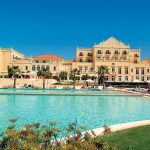Portugal’s future — all doom and gloom in a tomb says economist
The Old Man of Restelo
There is a literary Portuguese figure from Luís de Camões great masterpiece The Lusíadas who wanders up and down the beach casting a spell of doom and gloom on the endeavours of the Portuguese 15th century explorers who set out to discover new worlds.
Known as the ‘Old Man of Restelo’, the figure who warns the intrepid sailors not to set sail as it will all end in tears and disaster, has been handed down as a metaphor for the pessimistic Portuguese soul, like Captain Frazer from the famous BBC sitcom Dad’s Army who constantly says, “We’re Doomed!” to every crisis, or the curmudgeonly Basil Fawlty from Fawlty Towers endlessly banging on about the union strikes and the war.
The crown and mantle of catastrophism left by economist Henrique Medina Carreira, famous for waving disconcertingly downward economic graphs to more bewildered than worried TV audiences, has now finally been taken up. The throne is once again happily occupied by the new King of Gloom – Dr. João Duque.
Traditionally of the centre-right as an economist, he was certainly entertaining, like a chef mourner giving a elegy at a funeral, when he addressed business leaders at a lunch organised by the International Club of Portugal yesterday in an address entitled “Complex times requiring probing questions – What does the future hold for Portugal?”
I was actually left wondering if Portugal was actually already dead, consigned again to ‘Junk’ status, or if I still had time to make it to the hospital before the life support machines were switched off!
And the more worrying thing, if people hadn’t already cut their wrists en-masse by the end of the lunch, was that most of what the former ISCTE president and current President of SEDES had to say was …… true!
The evolution of the average growth rate over the past decades has plummeted. In the 90s it grew 3,7%, 2000 – 1,6% and 2000-2010 — 0,1% per annum.
But even more worrying than this is Portugal’s productivity. In the 1970s it grew vis-a-vis GDP by 3,6% per annum. In the 1980s — 2,1%, 1990s — 1,9%, 2000 – 1,2%, and to 2018 – 0,4%.
In other words, not enough growth or productivity for Portugal to maintain its welfare state or pay its state pensions. A scenario João Duque calls “very worrying”.
And the composition of Portugal’s GDP only really changed as a result of the crisis between 2008-2014 and not because internal consumption changed significantly (around 2/3), but rather because public and private investment fell significantly (investment in the 1980s was 30% of Portugal’s GDP) and now it is 18% which alarmingly is associated with Portugal’s loss of productivity.
Yes, Portugal’s productivity is dreadful compared to the booming sixties and seventies when wages were low and Portugal didn’t have to face China, the Far East and the former Soviet Bloc republics and countries that fell within Russia’s sphere of influence. But then are many of our traditional European partners doing much better?
And, indeed, ‘Bravo!’ to Portugal’s plucky new startups and enterprises who are taking on the world with astonishing export levels, which are relying less on the State and going out and forging their success and futures alone in overseas markets like the Discoverers once did.
Exports, however, have increased to around 44% of GDP, but imports have followed this increase as well since Portugal does not have raw materials or oil and gas and so has to import them.
“I think our increase in exports is very healthy, not just because it helps balance our external and trade accounts (Portugal has had a problem with balancing its external accounts for centuries), but also because the increase in dependance on exports piles on the pressure on companies to export more.
When our companies aren’t exporting we have a bigger problem than we had before because now we depend even more on these exporters. This is good, because the companies that are exporting are increasingly in line with best practices and good strategies for competing, abandoning easy and protectionist environments in favour of those where it is much more difficult to compete and where very often the entrepreneurs feel a great competitive disadvantage.
And then there were the other problems. Portugal does indeed have one of the highest public debts in Europe – some €240Bn. Portugal is suffering from an ageing, shrinking population so that according to statistical forecasts by 2060 the population will be 8.5 million with an active age population of 4.4 million. “Portugal will have 800,000 fewer active age persons than today and 400,000 less people actually employed” warns Duque.
“This means that by 2060, even if all the people of active age are employed, we will not be able occupy all the job posts necessary.” And this means that unless wages keep pace with available jobs, those posts won’t get filled.
Perhaps we shouldn’t be too worried since accordion to many futurists and André Jordan there won’t be any jobs anyway as robots and AI will have taken them!
But, he is right to worry when all the best-educated talent in Portugal bugger off abroad in search of higher salaries and better opportunities in other countries like Germany, the UK, France and Switzerland.
So, Portugal we are correctly told has sold off its ‘family silver’ in energy, insurance, private health and banks to foreign investors. In the 1990s the assets held by the Portuguese overseas versus the assets held by foreigners in Portugal was around 13% of GDP to Portugal’s disadvantage. In 2014 it stood at 118% and in 2018 – 100%.
“This is the accumulated proof over decades of successively alienating the ownership of our share in property and the profits from these foreign-owned companies are more than likely sent overseas” Duque observes.
So, everything in Portugal is owned by foreigners. Well, thank goodness someone came in and injected a shot of capital antibiotics into the arm of an otherwise moribund patient on an IMF life support machine a decade ago.
But then in a global economy, based on a Neo-liberal economic model, that’s good isn’t it? I mean isn’t that capitalism in action and isn’t that how it is supposed to work? He should read Fully Automated Luxury Communism by Aaron Bastani. It has some challenging ideas.
And non-regulated “influence” — cronyism, corruption, jobs-for-the-boys and ‘cunha’ — that lovely little Portuguese word that nearly encapsulates the idea of ‘its not what you know, or how good you are, it’s who you know in positions of power and influence that gets you places in Portugal’ was rightfully and justly attacked because “it creates vices and dependencies” and must be swept away in order for a meritocracy to function.
As was the idea that Portugal’s politicians must stop fighting elections by promising bread and circuses in the shape of the national health service and pensions.
Successive governments indeed cannot continue increasing taxes and more indirect taxes which cripple companies and families and cut the working salaries of ordinary people by a half (if national insurance contributions are counted).
João Duque is probably right when he says the Government’s dreams of pharaonic infrastructure projects at the Port of Sines and attendant rail links are senseless given the country’s peripheral location.
And he is right to worry that all the best-educated talent in Portugal bugger off abroad in search of higher salaries and better opportunities in other countries like Germany, UK, France and Switzerland.
And right too is his analysis of consumer savings of disposable income which have dwindled to a trickle over the past 30 years. In the 90s — 12%, 2000 – 9.5%, 2000-2010 — 6,7% and now even less. But then, with such high tax rates and low wages, coupled by the high cost of housing, energy, fuel and basically the cost of living for ordinary families, it’s hardly surprising.
He says the State will not have good managers and professionals because the best will go to the private sector or overseas. He is right. But then how can the State compete. It can’t. It ultimately has no choice but to decentralise and downsize.
He is absolutely right when he says that we are a product of our pasts and what we do today will influence how we are tomorrow. But the Portuguese need to do some serious soul searching to see why and how this disaster has happened and why its problems seem so intractable to solve. They themselves must accept some of the blame and act on the rottenness that lies at the core of the whole political system. As Joseph de Maistre once said, “Every nation gets the Government it deserves.”
But Chega! Simple solutions will not solve these problems in a complex interconnected world. They didn’t in the 1930s and they won’t this time either. But there are grounds for hope and they lie with the entrepreneurship of the myriad small and medium companies that make up this great seafaring nation and, above all, knowing, in the words of Industrial Confederation head, António Saraiva, “How to be small and compete by adding value, pooling know-how and sectorial cooperation”.
So, unless Portugal drastically cuts with the past it will, as he says, probably die like a snail in a pan of boiling water. Oh unhappy thought! But then again I don’t see Germany, France, Italy, the UK or many EU countries enjoying staggering growth rates rights now, and if the Eastern and some central European countries are, it’s because they pay miserable salaries, have awful social provision and are the new EU kids on the block.
Luckily, there are signs Portugal is turning the corner and facing the future with courage and tenacity, which João Duque freely admits, although the positive results may take a generation to be felt.
Chris Graeme










